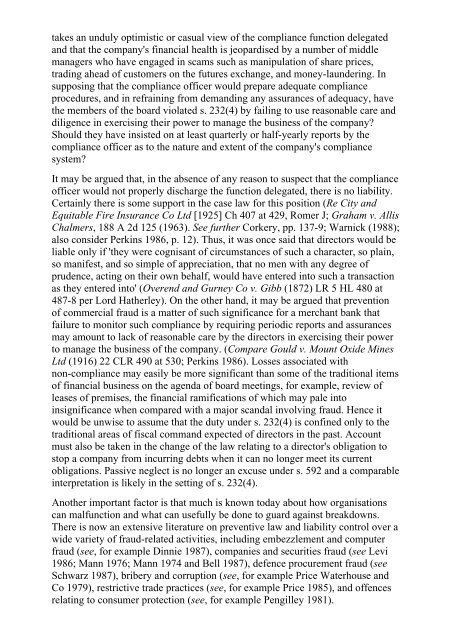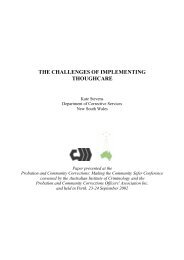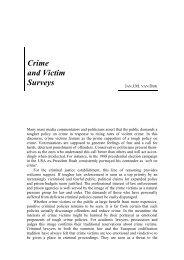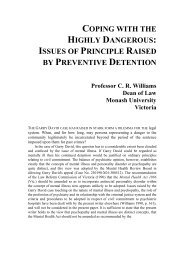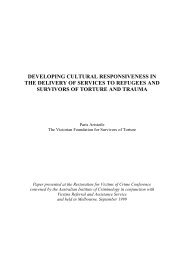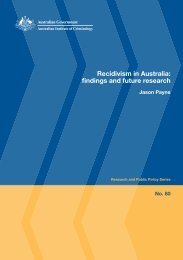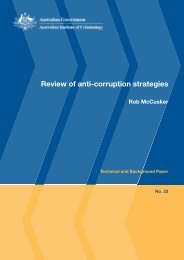Fraud and the liability of company directors - Australian Institute of ...
Fraud and the liability of company directors - Australian Institute of ...
Fraud and the liability of company directors - Australian Institute of ...
You also want an ePaper? Increase the reach of your titles
YUMPU automatically turns print PDFs into web optimized ePapers that Google loves.
takes an unduly optimistic or casual view <strong>of</strong> <strong>the</strong> compliance function delegated<br />
<strong>and</strong> that <strong>the</strong> <strong>company</strong>'s financial health is jeopardised by a number <strong>of</strong> middle<br />
managers who have engaged in scams such as manipulation <strong>of</strong> share prices,<br />
trading ahead <strong>of</strong> customers on <strong>the</strong> futures exchange, <strong>and</strong> money-laundering. In<br />
supposing that <strong>the</strong> compliance <strong>of</strong>ficer would prepare adequate compliance<br />
procedures, <strong>and</strong> in refraining from dem<strong>and</strong>ing any assurances <strong>of</strong> adequacy, have<br />
<strong>the</strong> members <strong>of</strong> <strong>the</strong> board violated s. 232(4) by failing to use reasonable care <strong>and</strong><br />
diligence in exercising <strong>the</strong>ir power to manage <strong>the</strong> business <strong>of</strong> <strong>the</strong> <strong>company</strong>?<br />
Should <strong>the</strong>y have insisted on at least quarterly or half-yearly reports by <strong>the</strong><br />
compliance <strong>of</strong>ficer as to <strong>the</strong> nature <strong>and</strong> extent <strong>of</strong> <strong>the</strong> <strong>company</strong>'s compliance<br />
system?<br />
It may be argued that, in <strong>the</strong> absence <strong>of</strong> any reason to suspect that <strong>the</strong> compliance<br />
<strong>of</strong>ficer would not properly discharge <strong>the</strong> function delegated, <strong>the</strong>re is no <strong>liability</strong>.<br />
Certainly <strong>the</strong>re is some support in <strong>the</strong> case law for this position (Re City <strong>and</strong><br />
Equitable Fire Insurance Co Ltd [1925] Ch 407 at 429, Romer J; Graham v. Allis<br />
Chalmers, 188 A 2d 125 (1963). See fur<strong>the</strong>r Corkery, pp. 137-9; Warnick (1988);<br />
also consider Perkins 1986, p. 12). Thus, it was once said that <strong>directors</strong> would be<br />
liable only if '<strong>the</strong>y were cognisant <strong>of</strong> circumstances <strong>of</strong> such a character, so plain,<br />
so manifest, <strong>and</strong> so simple <strong>of</strong> appreciation, that no men with any degree <strong>of</strong><br />
prudence, acting on <strong>the</strong>ir own behalf, would have entered into such a transaction<br />
as <strong>the</strong>y entered into' (Overend <strong>and</strong> Gurney Co v. Gibb (1872) LR 5 HL 480 at<br />
487-8 per Lord Ha<strong>the</strong>rley). On <strong>the</strong> o<strong>the</strong>r h<strong>and</strong>, it may be argued that prevention<br />
<strong>of</strong> commercial fraud is a matter <strong>of</strong> such significance for a merchant bank that<br />
failure to monitor such compliance by requiring periodic reports <strong>and</strong> assurances<br />
may amount to lack <strong>of</strong> reasonable care by <strong>the</strong> <strong>directors</strong> in exercising <strong>the</strong>ir power<br />
to manage <strong>the</strong> business <strong>of</strong> <strong>the</strong> <strong>company</strong>. (Compare Gould v. Mount Oxide Mines<br />
Ltd (1916) 22 CLR 490 at 530; Perkins 1986). Losses associated with<br />
non-compliance may easily be more significant than some <strong>of</strong> <strong>the</strong> traditional items<br />
<strong>of</strong> financial business on <strong>the</strong> agenda <strong>of</strong> board meetings, for example, review <strong>of</strong><br />
leases <strong>of</strong> premises, <strong>the</strong> financial ramifications <strong>of</strong> which may pale into<br />
insignificance when compared with a major sc<strong>and</strong>al involving fraud. Hence it<br />
would be unwise to assume that <strong>the</strong> duty under s. 232(4) is confined only to <strong>the</strong><br />
traditional areas <strong>of</strong> fiscal comm<strong>and</strong> expected <strong>of</strong> <strong>directors</strong> in <strong>the</strong> past. Account<br />
must also be taken in <strong>the</strong> change <strong>of</strong> <strong>the</strong> law relating to a director's obligation to<br />
stop a <strong>company</strong> from incurring debts when it can no longer meet its current<br />
obligations. Passive neglect is no longer an excuse under s. 592 <strong>and</strong> a comparable<br />
interpretation is likely in <strong>the</strong> setting <strong>of</strong> s. 232(4).<br />
Ano<strong>the</strong>r important factor is that much is known today about how organisations<br />
can malfunction <strong>and</strong> what can usefully be done to guard against breakdowns.<br />
There is now an extensive literature on preventive law <strong>and</strong> <strong>liability</strong> control over a<br />
wide variety <strong>of</strong> fraud-related activities, including embezzlement <strong>and</strong> computer<br />
fraud (see, for example Dinnie 1987), companies <strong>and</strong> securities fraud (see Levi<br />
1986; Mann 1976; Mann 1974 <strong>and</strong> Bell 1987), defence procurement fraud (see<br />
Schwarz 1987), bribery <strong>and</strong> corruption (see, for example Price Waterhouse <strong>and</strong><br />
Co 1979), restrictive trade practices (see, for example Price 1985), <strong>and</strong> <strong>of</strong>fences<br />
relating to consumer protection (see, for example Pengilley 1981).


